Review for Faust
Eureka continue their relentless programme of offering up some of the greatest films of all time with the best possible transfers with their ‘Masters of Cinema’ version of the F.W. Murnau blockbuster of yesteryear, ‘Faust’. This edition will be especially valued by fans of the film as it is the first to use the little-seen ‘domestic’ version, generally regarded as the best version by far. Being the generous folk they are, Eureka have also included the export version by way of comparison and provided a very neat ‘comparitor’ documentary which highlights the considerable differences between versions – but more on that later.
Before I get in with the review proper I should point out that it is a dual-format release and that I have had sight of only the DVD check-discs. All images posterdhere are taken directly from Eureka’s press site and should not be seen necessarily as indicative of the quality of either format version.
‘Faust’ was Murnau’s last German film and is a veritable block-buster, made at the same time as Fritz Lang’s ‘Metropolis’, and the studio (UFA), determined to make Faust an international success poured in virtually their last penny to make a big splash. As a result, despite its 1926 vintage, you can’t fail to be impressed by its scale, the special effects and dazzling expressionist art direction.
It’s full title is actually ‘Faust, eine deutsche Volkssage [Faust: A German Folktale]’ and it’s a film that has long been seen as one of the greatest silent films ever made.
Collaborating with screenwriter Hans Kyser, Murnau fused Faust’s script from German folk legend and the works of Goethe, Gounod, and Marlowe (particularly using the latter’s tone).
Faust’s tale is a classic one of a man who sells his soul to the devil. In an attempt to gain control of the Earth, Mephisto (Emil Jannings) wagers an angel (Werner Fuetterer) that he can corrupt the soul of the elderly professor Faust (Gosta Ekman). As the Horsemen of the Apocalypse ride demonically through the sky, Mephisto towers over Faust’s hometown unleashing a plague that spreads amongst its inhabitants. Faust, unable to find a cure for the citizens who are dropping dead around him, renounces both God and science invoking the aid of Satan through a mysterious book that he chances across.
Unlike modern film-making, due to the sheer scale of the scenes, two cameras were used (one to the left of the other) so that two original negatives could be produced simultaneously – one for the domestic market, and the second for export. Until now, the version that has been universally seen is the export version, one which commanded less of Murnau’s attention and which includes less impressive cinematography and a far looser cut.
Indeed, it was assumed that this was the only surviving version until recently when the original nitrate duplicate negatives printed by UFA were discovered and these, along with an array of international sources, were used by Luciano Berriatua for Filmoteca Espanola to re-construct the domestic version in all its glory.
Although the idea of a high-brow spiritual folk-tale concerning pacts with the devil may well sound like heavy going, particularly as a silent film, it really isn't a tough or cerebrally challenging view. In fact, it’s actually rather like sitting down to watch a contemporary block-buster, full of special effects, high drama and lots of action.
Whilst I only viewed the DVD version, the print for the domestic version of the film was superb. Deep blacks, great clarity of image and very little sign of wear for a film of this considerable vintage. I can only imagine how impressive this must look in Blu-ray.
Another nice feature is that there are two scores on the domestic version to choose from. The first is an orchestral score from Timothy Brock (who also provides the score for the export version on Disc 2) and there is an alternative, more sedate harp score by 84 year old Stan Ambrose. Whilst I listened briefly to the harp score I preferred the drama of the orchestral score for this viewing. Composer Brock did an amazing job on Murnau’s ‘Sunrise’ and he does equally well here, really enhancing the scale of the drama.
Predictably, this edition also houses a host of great extras. First up is a full-length audio commentary by American critic David Ehrenstein and film-scholar and documentary-maker Bill Krohn. It’s a film-class in its own right and their mutual enthusiasm for the work is utterly infectious.
There’s also A 20-minute video piece with critic and screenwriter Tony Rayns discussing the film and giving some great historic context. Though filmed (I presume) recently some small attempt has been made to give the very standard looking video interview a ‘retro’ look by throwing it into black and white and cropping 4:3.
Perhaps of most interest to those who already have a previous edition of the film but are purchasing this edition to get a look at the domestic version is the informative comparison between the two versions where scenes from both are played simultaneously in two windows on screen to really bring home the differences.
Although I didn’t receive a copy with the check-discs, the set comes with a 40-page booklet with an essay by Peter Spooner, writing on the film by Éric Rohmer, and rare archival imagery.
All in all, a fantastic package that every self-respecting cinephile will want to add to their collection.
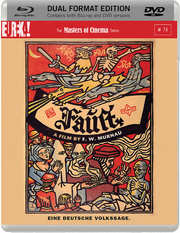
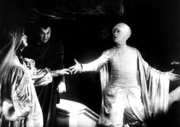
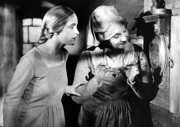
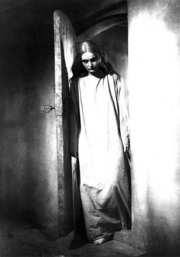
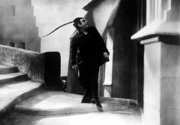
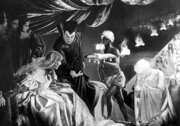





































Your Opinions and Comments
Be the first to post a comment!